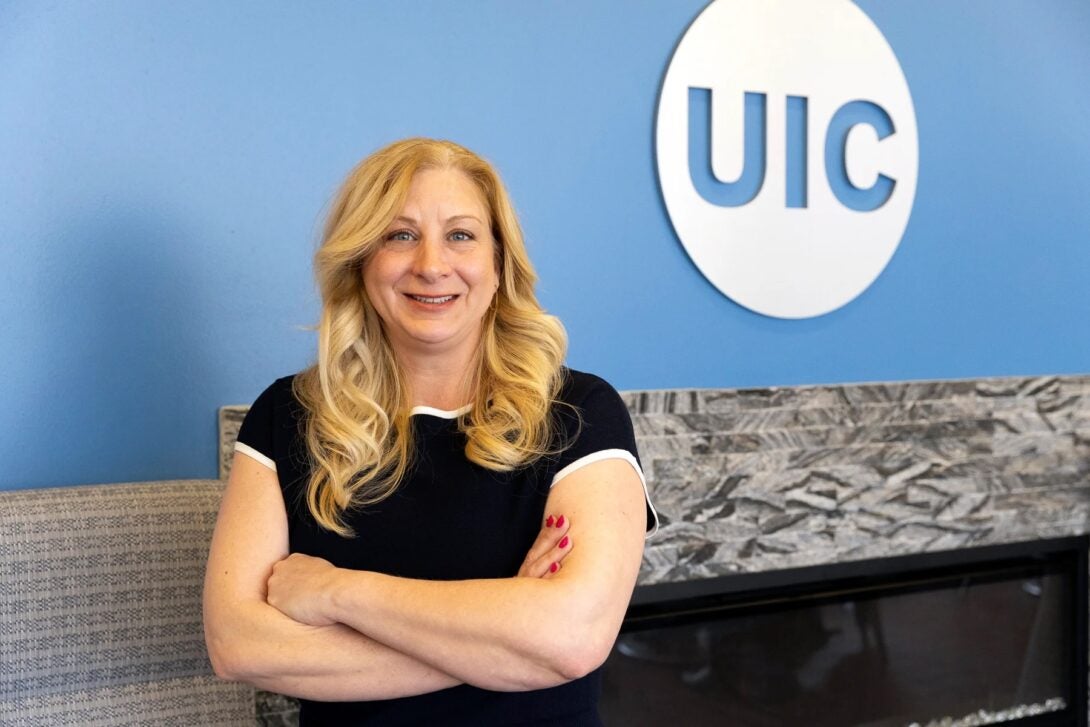Celebrate SPH Inspiring Grad Elizabeth Froelich
E. Froelich Story

Shared from UIC Today story published May 5, 2025
Before pursuing a bachelor’s degree at UIC, Elizabeth Froelich already had a 30-year career saving lives as a paramedic, including 15 years with the Chicago Fire Department.
For the last five of those years, she was the commander of an ambulance serving Chicago’s West Side that responded to over 8,500 calls annually.
“At that time, it was the busiest ambulance in the nation,” she said. “I loved responding to calls. I liked the adrenaline rush.”
But a change in her health altered her path. After a routine mammogram in 2016, Froelich learned that she had breast cancer. Unable to continue in her role, she considered what a meaningful new career could look like.
“I was 41 years old, and I had to figure out what I wanted to be when I grew up,” Froelich said. “I had never finished college because when I was hired by the fire department, I thought: This is what I’m going to do forever.”
Her experiences on the front lines shaped her next steps. Witnessing health disparities firsthand, she wanted to work toward improving health outcomes for all patients. She received her associate degree in science from Wilbur Wright College, then transferred to UIC in 2023 to pursue her bachelor’s degree in public health.
“I saw the disparities working on an ambulance and the lack of access to care, but I didn’t understand why so many people called 911 for nonemergency situations,” she said. “Racial and socioeconomic disparities exist within the health care system. Coupled with rising health care and prescription costs, as well as a lack of primary care providers, these barriers leave people with limited options.
“When someone consistently struggles to make ends meet, health care needs take a back seat, and emergency systems become the primary means of treatment, even for basic needs.”
Part 2
At UIC, she also works for Illinois Heart Rescue, an initiative in the UIC Department of Emergency Medicine dedicated to improving survival rates after cardiac arrest and advocating for better emergency response systems.
With Illinois Heart Rescue, Froelich provides CPR, opiod overdose and bleeding control trainings across the state, to public school teachers, state representatives at Illinois State Capitol Building and even the general public at Wrigley Field before Cubs games.
She also supports the group’s advocacy work. She helped write a bill recently passed by the Illinois Senate that will require 911 dispatchers to be trained in current telecommunicator CPR guidelines and provide CPR instructions to callers.
“One of the things that we found is when people call 911, not every 911 caller is offered CPR instruction,” Froelich said. “I know from my experience on the fire department that when people are in crisis, they have three reactions: fight, flight or freeze. So bystanders sometimes need instruction to react.”
She’s also working with Chicago’s Office of Emergency Management and Communications to improve rates of bystanders administering CPR. One step they’ve taken is to simplify instructions for 911 callers to assess whether CPR is needed. Instead of asking a caller if a person is “conscious,” emergency dispatchers will now ask, “Are they awake?”
“That’s easier for any caller to understand,” Froelich said.
She’s also the state coordinator for the Cardiac Arrest Registry to Enhance Survival, a database that helps communities measure the effectiveness of their emergency response systems. As an emergency medical systems educator, she’s also led disaster drills at the Northeastern Illinois Public Safety Training Center and taught as an adjunct faculty member in Triton College’s EMT program.
Though she already has years of experience in health care, Froelich said she’s learned a lot from her classmates.
“As an adult student, I don’t look at the students in my cohort as ‘kids,’ although I often joke and call them kids because they are the same age as my children,” she said. “However, they have so many experiences to offer and so many different perspectives that I have been able to learn as much from them — just hearing their points of view on public health issues and giving context that I had no background in — so that has been incredible.”
Froelich will return to UIC in the fall to pursue her master’s degree in public health, with a focus on epidemiology and policy.
“When I got here, I didn’t realize how many barriers people come up against and how difficult it is to change the system,” she said. “The projects that I do now, I would not be able to do without the foundation of what I learned here.”
As Froelich graduates with honors from the School of Public Health on May 11 — Mother’s Day — she wants to be an example for her daughters, Grace, 19, and Emily, 17.
“I’m a first-generation college graduate, and I wanted my kids to look at me and think: You’re never too late,” she said.